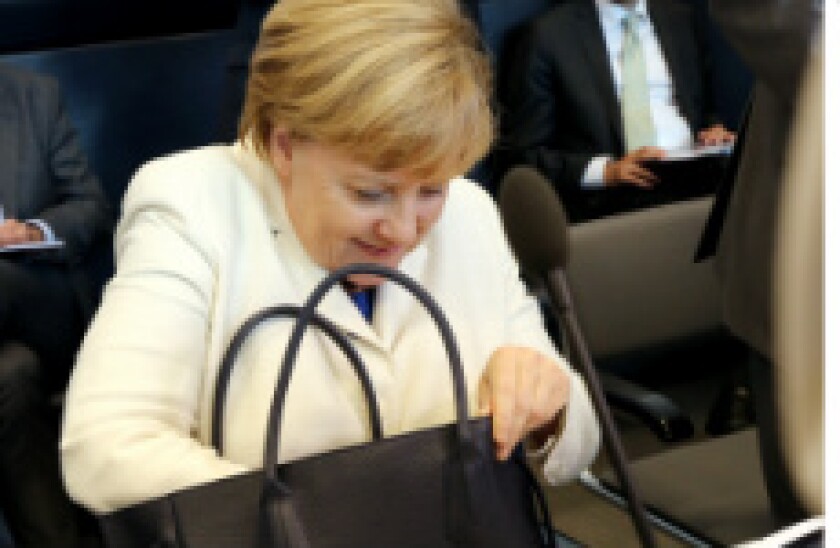The trouble is, German politicians — from Merkel down — can say nothing else. There are three choices of response to the question “would you support Deutsche Bank”?
These are, respectively, yes, no comment, and no.
Saying yes runs directly contrary to European law, to the meticulously negotiated but barely functional patchwork of rules supposed to end 'moral hazard' and taxpayer support for failing banks. It runs directly contrary to German pressure on Italy to jump through increasingly elaborate hoops to aid its banks in dealing with their non-performing loans. It’s political suicide, and it capitulates at the very start of the game of bluff which European authorities apparently have to play with US prosecutors these days. In other words, it’s a total non-starter.
Saying no comment is a weasel way out. Journalists, rightly, hate it. But it also comes with exactly the same problems as saying yes, because the way to get a headline out of a no comment is to write that Merkel refuses to rule out support for Deutsche Bank. Even gnomic silence wouldn’t help.
That leaves saying a firm nein as the only possible option.
That's what Merkel came out with, and that newsflow has dominated Deutsche sentiment for most of the week. Monday saw panic; by Wednesday there was a rumoured plan for the German government to take 25%, swiftly and emphatically denied by the bank and the government. Other German lawmakers, feeling left out, also clamoured to offer their views on Deutsche.
But none of it has any bearing on what will actually happen to Deutsche when the chips are down.
A straightforward, retro, crisis-style bailout probably won’t happen. For one thing, it isn’t allowed under European law. For another, Deutsche Bank’s problems don’t look like they’ll manifest in a Lehman-style sudden stop. With central bank spigots still gushing, the bank won’t run out of short term liquidity any time soon.
Instead, if the final settlement offer from the US Department of Justice comes in unmanageably high (and that's a big if. US prosecutors read the financial press too, and even they wouldn’t endanger the global financial system just for a big score) expect a long, drawn-out, agonising capital squeeze.
Perhaps Deutsche delays its dividends and AT1 coupons indefinitely. Perhaps it goes back to shareholders for a final, exceptionally dilutive rights issues. The market won’t contribute any new capital cheaply, in bond or equity form, but it’s not clear that Deutsche is locked out of the market entirely — and there are plenty of ways for the state to support the bank’s recovery that stop short of full nationalisation.
Look at Monte dei Paschi. Far less systemic than Deutsche Bank, it has been far more obviously broke for far longer, But still it struggles on, shorn of its senior management, and heading for another recap. It expects to use state support to get rid of its non-performing loans and the Italian government may need to ease its recapitalisation plan to market as well.
The downside scenario for Deutsche looks far more like this kind of lengthy solvency squeeze than a sudden liquidity stop, with a state backstop (or not) over the weekend. If the German government needs to support it, this will come piecemeal — a helping hand, not a blanket guarantee.
But make no mistake, Deutsche will get this if it needs it.
The financial system is far, far more resilient than when Lehman went down. Vast networks of previously uncollateralised, bilateral exposures have been collateralised and cleared, while capital levels at every institution have shot up. But the system is nowhere close to ending too-big-to-fail and tolerating the collapse of a G-SIB with equanimity. The collapse of Deutsche, however drawn-out, will do huge damage to the German economy, the wider European economy and the financial sector everywhere,
It’s worth emphasising too that support doesn’t have to mean big crisis-style money down; the DoJ has asked for $14bn but Deutsche has said it has no intention of settling near that figure.
Some estimates reckon the bank can suck up $7.5bn before stopping coupons on its AT1 — that would be higher than any bank’s settlements so far except JP Morgan and Bank of America, and higher than the usual reduction of about two-thirds from the opening bid.
But it’s easy to say all this without any Deutsche Bank exposures. However unlikely it is that the bank disappears entirely, holders of DB equity and additional tier one are in for a wild, painful ride until the bank’s litigation woes go away.

